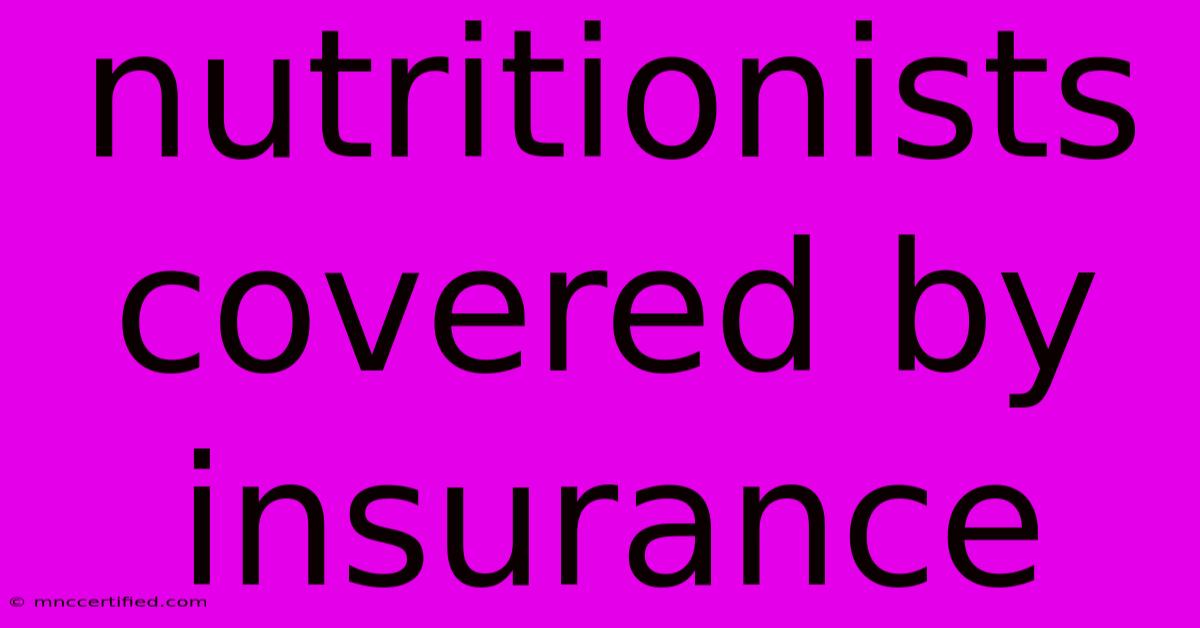Nutritionists Covered By Insurance

Table of Contents
Finding Nutritionists Covered by Insurance: A Comprehensive Guide
Finding a registered dietitian or nutritionist is a crucial step towards improving your health, but the cost can be a significant barrier. Many people are unaware that their insurance plans may cover at least some of the expenses associated with seeing a nutritionist. This comprehensive guide will help you navigate the process of finding nutritionists covered by your insurance and maximizing your benefits.
Understanding Your Insurance Coverage
Before you begin your search, understanding your insurance policy is paramount. Here's what you need to check:
- In-Network Providers: Your insurance likely has a network of preferred providers. Seeing a nutritionist within this network will usually result in lower out-of-pocket costs. Check your insurance provider's website or contact their customer service to access a list of in-network dietitians and nutritionists. Look for keywords like "registered dietitian," "licensed dietitian," or "nutritionist."
- Pre-authorization: Some insurance plans require pre-authorization before covering nutrition services. This means you need to get approval from your insurance company before your appointment. Failing to do so could result in denied claims.
- Coverage Limits: Insurance plans often have annual limits on coverage for certain services, including nutrition counseling. Understanding these limits will prevent unexpected costs.
- Deductibles and Co-pays: Be aware of your deductible (the amount you pay before insurance coverage begins) and co-pay (the fixed fee you pay per visit). These costs will apply even if your nutritionist is in-network.
- Diagnostic Codes: Your doctor may need to provide a specific diagnostic code (ICD-10 code) to justify the medical necessity of nutrition counseling. This is especially important for conditions like diabetes, heart disease, or eating disorders.
How to Find In-Network Nutritionists
Once you understand your coverage, here's how to find nutritionists covered by your insurance:
- Your Insurance Provider's Website: The most reliable source is your insurance company's website. Most insurers have online provider directories that allow you to search by specialty (Registered Dietitian, Nutritionist) and location.
- Your Doctor's Referral: Your primary care physician or specialist may be able to recommend nutritionists who accept your insurance. They can also assist with obtaining necessary pre-authorization.
- Online Search Engines: Use search terms like "nutritionists near me covered by [insurance company name]" or "registered dietitians accepting [insurance company name] [your city/zip code]". Be sure to verify the information found online with your insurance provider.
- Professional Organizations: Organizations like the Academy of Nutrition and Dietetics (AND) may have tools to help you find registered dietitians in your area. However, always verify insurance coverage directly with the provider and your insurer.
Maximizing Your Insurance Benefits
To make the most of your insurance benefits:
- Keep Detailed Records: Retain all receipts, Explanation of Benefits (EOB) statements, and other relevant documentation. This will be crucial if there are any billing disputes.
- Ask Questions: Don't hesitate to ask your insurance provider or nutritionist questions about coverage, billing, and procedures. Clear communication is key.
- Appeal Denied Claims: If your claim is denied, understand the reason for denial and consider appealing the decision. Insurance companies often have specific procedures for appeals.
Beyond Insurance Coverage: Affordable Options
Even if your insurance doesn't fully cover nutrition services, there are alternative ways to access affordable care:
- Sliding Scale Fees: Some nutritionists offer sliding scale fees based on income.
- Community Health Centers: These centers often provide low-cost or free nutrition services.
- Telehealth: Online nutrition consultations can sometimes be more affordable and convenient.
Finding a nutritionist covered by your insurance requires proactive research and communication. By following these steps, you can increase your chances of accessing affordable and effective nutrition care to achieve your health goals. Remember, investing in your health is an investment in your future!

Thank you for visiting our website wich cover about Nutritionists Covered By Insurance. We hope the information provided has been useful to you. Feel free to contact us if you have any questions or need further assistance. See you next time and dont miss to bookmark.
Featured Posts
-
Car Insurance Underwriting Process
Nov 16, 2024
-
Homeowners Insurance Chesapeake Va
Nov 16, 2024
-
Gateway Insurance Customer Service
Nov 16, 2024
-
Dental Codes For Insurance Billing
Nov 16, 2024
-
Perspective Insurance Sioux Center
Nov 16, 2024